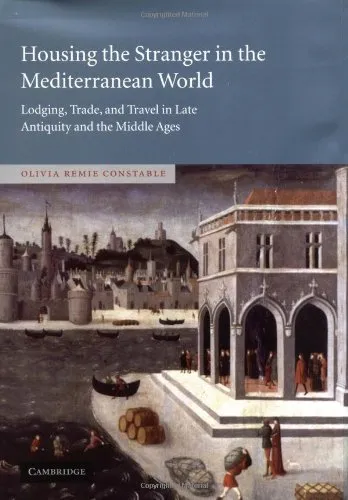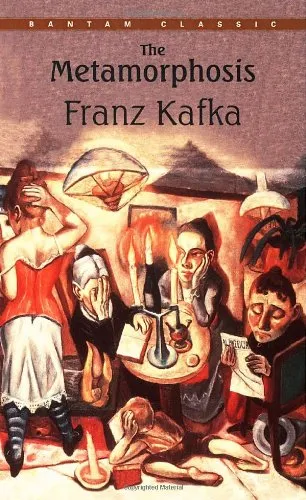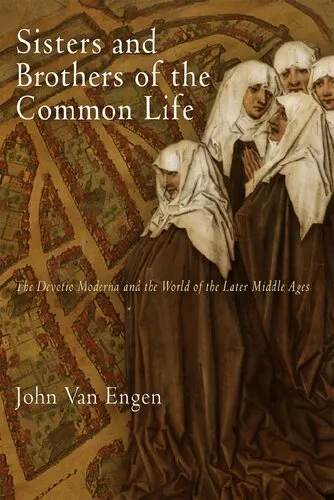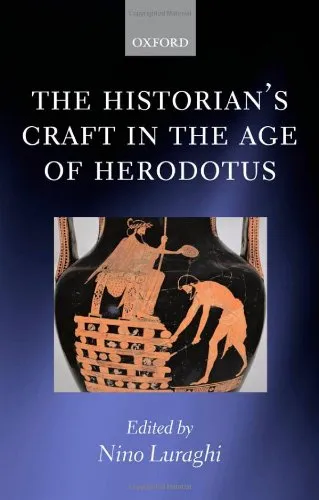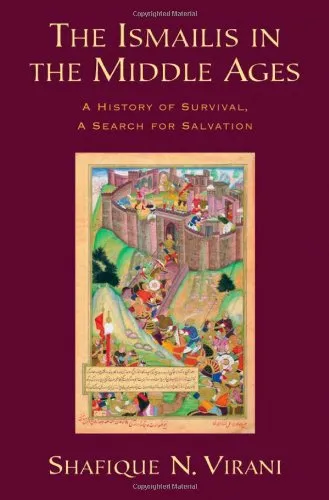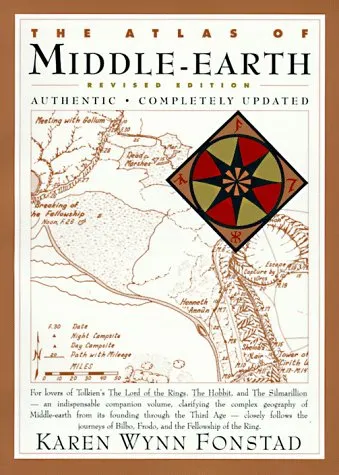Housing the Stranger in the Mediterranean World: Lodging, Trade, and Travel in Late Antiquity and the Middle Ages
4.5
بر اساس نظر کاربران

شما میتونید سوالاتتون در باره کتاب رو از هوش مصنوعیش بعد از ورود بپرسید
هر دانلود یا پرسش از هوش مصنوعی 2 امتیاز لازم دارد، برای بدست آوردن امتیاز رایگان، به صفحه ی راهنمای امتیازات سر بزنید و یک سری کار ارزشمند انجام بدینکتاب های مرتبط:
معرفی کتاب
کتاب 'Housing the Stranger in the Mediterranean World: Lodging, Trade, and Travel in Late Antiquity and the Middle Ages' نوشته شده توسط من، اولیویا رمی کنستانتبل، بررسی جامعی از نقش و اهمیت فضاهای اقامتگاهی و مدیریت مهاجرین در دنیای مدیترانه در دوران باستان و قرون وسطی ارائه میدهد. این کتاب به تحلیل چگونگی تعامل جوامع مختلف از طریق فراهم کردن امکانات اقامتی برای مسافران میپردازد و به بررسی نقش اقتصادی و اجتماعی این مکانها در هدایت تجارت و تردد میپردازد.
خلاصه جامع کتاب
در این کتاب، ابتدا به بررسی مفاهیم مربوط به فضاهای اقامتگاهی از جمله مهمانخانهها، کاروانسراها، و اشکال مختلف مکانهای اقامتی در جوامع مدیترانهای و نقشی که این مکانها در تسهیل تجارت و گردش در دوران باستان و قرون میانه داشتند پرداخته میشود. کتاب چشماندازی نسبت به شکلگیری و تکامل این فضاها به عنوان مراکز اقتصادی و فرهنگی ارائه میکند، و همچنین به نقشی که این مکانها در شکلگیری هویت جوامع محلی داشتند اشاره دارد. از طریق مطالعه منابع تاریخی و تحلیل متون، مفهوم میهماننوازی و مدیریت مهاجرین در طول این دوران بررسی و تشریح میشود.
نکات کلیدی
- تحلیل تطور مکانهای اقامتی و تفاوتهای فرهنگی در برخورد با غریبهها و مسافران.
- بررسی تعاملات اجتماعی و اقتصادی در جوامع مختلف مدیترانه از طریق زیرساختهای اقامتی.
- جایگاه مکانهای اقامتی در گسترش شبکههای تجاری و فرهنگی.
- نقش اقامتگاهها در حفظ هویت محلی و تعامل فرهنگی.
نقلقولهای معروف از کتاب
"در بسیاری از موارد، فضاهای اقامتی چیزی بیش از مکانی برای استراحت شبانه بودند؛ آنها نقاط مرکزی برای تعاملات فرهنگی و اقتصادی محسوب میشدند."
"حوادث تاریخی بزرگ و کوچک اغلب از این مکانهای اقامتی به عنوان محل تلاقی راهها و اندیشهها خاطرهانگیز میشوند."
چرا این کتاب مهم است
این کتاب به دلیل رویکرد جامع و بینرشتهای خود و نیز اهمیت موضوعاتی که بررسی میکند، از اهمیت بالایی برخوردار است. تحلیل چگونگی تاثیرات متقابل فرهنگی و اقتصادی از طریق مدیریت فضاهای اقامتی، درک عمیقتری از تاریخ اجتماعی و اقتصادی دنیای مدیترانهای ارائه میدهد. این کتاب برای پژوهشگران علوم انسانی، تاریخ، مطالعات شهری، و علاقهمندان به تاریخ فرهنگی و اجتماعی مفید و آموزنده است و به آنها کمک میکند تا پیچیدگیهای تعاملات تاریخی و فرهنگی را بهتر بفهمند.
Welcome to an exploration of the fascinating interplay between lodging, trade, and travel in the Mediterranean during late antiquity and the Middle Ages. 'Housing the Stranger in the Mediterranean World' by Olivia Remie Constable offers a comprehensive look into how the movement of people and goods shaped cultures and commerce across this historically significant region.
Detailed Summary of the Book
The Mediterranean world between late antiquity and the Middle Ages was a dynamic area where diverse cultures, economies, and traditions intermingled. Olivia Remie Constable's book delves into the central role of lodging in the context of trade and travel, shedding light on how strangers were housed and how those practices influenced broader societal frameworks.
From caravanserais and khans to hospices and hostels, Constable navigates through different accommodations that catered to the needs of varied travelers – from merchants and pilgrims to diplomats and adventurers. She examines how these lodgings were not just places of rest but were complex economic and social hubs that facilitated cross-cultural interactions and exchange. The author combines the study of architectural structures with legal, social, and economic texts to comprehensively portray the significance of these establishments in connecting the Mediterranean's diverse polities.
Key Takeaways
- Social and Economic Networks: Lodging places were crucial nodes in the vast networks of trade and communication, revealing the interconnectedness of the Mediterranean world.
- Cultural Exchange: The variety of lodging practices illustrates the rich cultural exchanges that occurred as different peoples interacted through commerce and pilgrimage.
- Architectural Adaptation: The structures and amenities of lodgings adapted to the varied needs of travelers, reflecting the diversity of cultural influences in the region.
- Legal and Religious Aspects: Laws and religious customs influenced how strangers were accommodated, providing insights into societal norms and values.
Famous Quotes from the Book
"Lodging places served as more than simple shelters; they were arenas of interaction where cultures, ideas, and commerce converged."
"The act of housing a stranger was laden with meaning and possessed the power to transform both host and guest."
Why This Book Matters
This book is an essential read for anyone interested in the history of the Mediterranean, medieval studies, or the history of commerce and trade. It offers fresh insights into how a seemingly simple act – offering a place to stay – was deeply integrated into the economic, legal, and social fabrics of societies. By analyzing lodging, Constable opens a window into understanding broader cultural and economic processes in a cosmopolitan world that has all too often been viewed through the lens of conflict rather than cooperation.
Furthermore, Constable's work challenges modern perceptions by showing how historical societies handled the complexities of hospitality and cohabitation. The study of lodging places uncovers patterns of human behavior and societal organization that resonate with contemporary discussions on globalization, migration, and multiculturalism.
The book is praised for its interdisciplinary approach, drawing from history, sociology, architecture, and economics to provide a rich and textured understanding of the past. Its analysis is fundamental to appreciating the historical depth of today's interconnected world.
دانلود رایگان مستقیم
شما میتونید سوالاتتون در باره کتاب رو از هوش مصنوعیش بعد از ورود بپرسید
دسترسی به کتابها از طریق پلتفرمهای قانونی و کتابخانههای عمومی نه تنها از حقوق نویسندگان و ناشران حمایت میکند، بلکه به پایداری فرهنگ کتابخوانی نیز کمک میرساند. پیش از دانلود، لحظهای به بررسی این گزینهها فکر کنید.
این کتاب رو در پلتفرم های دیگه ببینید
WorldCat به شما کمک میکنه تا کتاب ها رو در کتابخانه های سراسر دنیا پیدا کنید
امتیازها، نظرات تخصصی و صحبت ها درباره کتاب را در Goodreads ببینید
کتابهای کمیاب یا دست دوم را در AbeBooks پیدا کنید و بخرید
1274
بازدید4.5
امتیاز0
نظر98%
رضایتنظرات:
4.5
بر اساس 0 نظر کاربران
Questions & Answers
Ask questions about this book or help others by answering
No questions yet. Be the first to ask!
